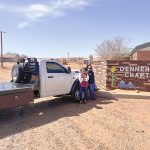
Elected leaders have rights, and so do the people they serve
By Tommy Arviso Jr.
Special to the Times
A subject that has long been a controversial issue with elected tribal leaders, high-ranking government officials and political appointees, is the right to privacy when it comes to their personal lives. Most of the people in these positions of authority feel that what goes on in their personal lives is no one’s business except theirs, regardless of the position they hold.
This is especially true in their relationship with the media. They say that there are some personal issues, actions and consequences that should not be reported to the public.
As the former publisher of the Navajo Times, I agree with these public officials. There are things that happen in life that we have no control over, both good and bad, and the results of those instances should be kept private. That’s a personal decision that deserves to be rightfully considered and respected.
However, there is also another view to this right of privacy by public officials and elected leaders, and that is when they inflict or are involved in an action or situation that affects, hurts, or jeopardizes the people that they serve, including their own families.
This is when the public officials’ claim to privacy takes a back seat to the people’s right to know the truth. This is when the media have a right and a responsibility to report the factual news to the public.
This is also the time that conflict and disagreement generally occur between the affected public officials and their supporters, and the media.
I have dealt with these kinds of situations numerous times during my tenure at the Navajo Times. There were times that I agreed with certain public officials that their respective situation was not a news story based on fact, or that an article would likely cause unneeded hurt to innocent people and victims, especially children and elders.
On the other hand, there were times when I disagreed with elected officials and leaders to withhold their important personal information, and the Navajo Times reported on the situation that they were involved with. We published articles that were based on fact, with supporting documents. The result was that the readers and the Navajo people were informed of the truth of what was going on with that public official or elected leader.
Often after an article was published on such an incident, the readers and public would react in a variety of ways. The public official or elected leader in the article, plus his or her supporters, would lash out and accuse the Navajo Times of lying and misleading the people. On the other hand, there were readers who praised the Navajo Times for telling the truth.
Then, you had those folks who stayed neutral on the reported news. They didn’t view the article as positive or negative, and they seem to understand the significance of the people’s right to know, as well as the value of a person’s right to privacy.
On the morning of Aug. 16, 2023, the Navajo Times was informed by a reliable source that Navajo Nation Vice President Richelle Montoya had informed her staff that she was separating from her husband and that she wanted to issue a public statement.
Navajo Times reporter Rick Abasta then wrote a short article about the impending situation with the vice president and her husband, Olsen Chee. The article was posted on the Navajo Times website. About 30 minutes later, the president’s office issued its press release which detailed the vice president’s marriage separation.
Later that day, Vice President Montoya issued her own statement through Facebook.
Now, what happened when the Navajo Times’ article was posted on its website was a big backlash from viewers who claimed that the article was nothing but gossip, untrue and was tabloid trash. There were also claims that the Navajo Times had no right to interfere in the vice president’s private life and her personal affairs.
What the viewers didn’t know was that this was public information because Vice President Montoya wanted it to be. She did not want to have news of her separation be leaked, and then have it blasted all over social media. Instead, she chose to let the Navajo people know of what was taking place in a tasteful and professional manner.
I respect Vice President Richelle Montoya and her decision and action. Her marriage separation really is her own private business and I understand that and support her. I hope for only the best for Vice President Montoya and her husband, and their family.
Now that she has shared her story with us, we need to give Vice President Montoya and her family the privacy and respect that they deserve and have requested. I believe that Vice President Montoya handled her respective situation with class and professionalism, and I applaud her for that.
Public officials and elected leaders do have their right to privacy so long as they acknowledge and know that the people they serve, also have a right to know the truth.
I recall a time when Navajo Times staff and I received a lot of flak and pressure from a former tribal leader, his administration, and supporters, after we reported on his indiscretions and troubling behavior while in office. We were accused of meddling in private family affairs, and printing gossip. This was far from the truth, and we stood by our reporting and articles.
While this was happening, I got a surprise telephone call early one morning in my office. The caller was the late Peterson Zah, who served as Navajo Tribal chairman and was the first Navajo Nation president. He told me to continue to report the truth and not let the political pressure get to me, and to stand strong.
“When you are the elected leader of the Navajo people, you have no private life,” said Mr. Zah. “You are there to serve the people and that is the most important thing. The people see you and they watch everything you do. That is their right.”
I wrote those words down after we finished our conversation and I remember them, and his voice, like it happened just this morning. I have the utmost respect for Mr. Zah as a leader and as a man, and his legacy is a big part of our Navajo tribal history.
I believe that we all stand to learn from the actions and words of Vice President Montoya, and from our former leader, Peterson Zah. In addition to understanding and accepting their roles as public servants, Vice President Montoya and former President Zah respected the people they were chosen to serve and represent.
Those are traits of a true leader.

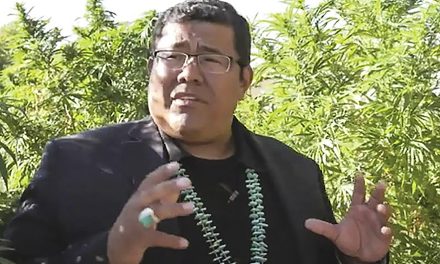
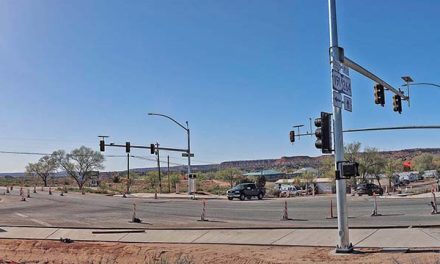
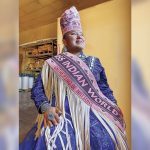
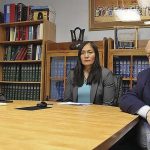


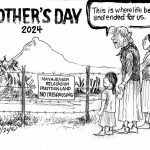


 Highway 264,
Highway 264, I-40, WB @ Winslow
I-40, WB @ Winslow